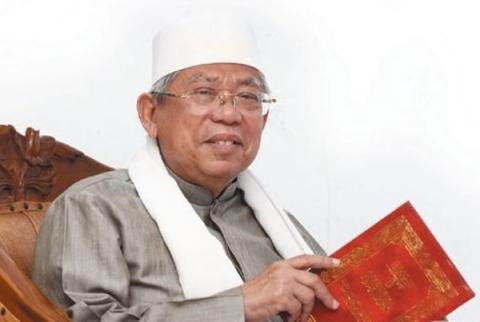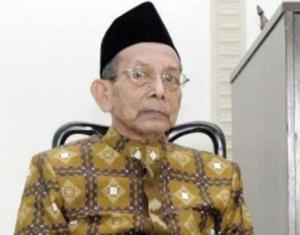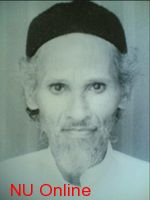Running enterprises to finance pesantren
NU Online · Selasa, 1 April 2008 | 08:53 WIB
Since the coming of Islam in Java island there have been many Islamic boarding schools (pesantren). Inhabitants have become accustomed to religious life and open-minded. The scene could be traced through social and psychological condition in Paciran, Lamongan East Java where his excellencies the caretaker of Pesantren Tarbiyatut Thalabah KH Muhammad Baqir Adelan was born.<>
Baqir was born in a sleepy village located in the north coast of East Java, exactly in Kranji village, Paciran district, Lamongan regency, East Java province, on 30 August 1934/19 Jumadil Ula 1353. He was the sixth son from twelve of the marriage of KH Adelan bin Abdul Qodir Kranji with Nyai Hj. Sofiyah binti KH Musthofa.
Baqir then grew up and spent his childhood and had intelligence much brighter than his fellow friends. On account of the social and psychological condition of the free and independent people living in the north coast, Bagir had such the courage and talent in entrepreneurship.
His first educational process was from his beloved mother Hj. Nyai Sofiyah, his grand mother Nyai Aminah Sholeh then his uncle KH Abdul Karim and his grand parent KH Musthofa Abdul Karim to focus more on religious knowledge. Since his seven years old Bagir continued studying in a formal educational institution, namely Madrasah Tarbiyatut Thalabah Kranji led by his own uncle KH Abdul Karim Musthofa for four years. He was then continuing his study at Madrasah Muallimin in Tunggul village Paciran district from 1940-1944 under the supervision of an ulema KH Muhammad Amin Musthofa.
Due to his bright educational career so it is reasonable if since his 14-year-old age he was mandated by his teacher to help teach in pesantren and involve in any preaching activity in his community. Started from the Tunggul’s Madrasah Muallimin Baqir was to take part in sharing his knowledge with local people. He then continued his study in Pesantren Bahrul Ulum, Tambak Beras, Jombang, in 1952 under the supervision of KH Abdul Jalil.
One of his achievements during his study in the pesantren was his talent in entrepreneurship. For being admitted in fifth class he could finish his two years of study in the secondary (ibtidaiyah) level. Because of his willingness to be independent following his graduation from the ibtidaiyah he then moved from the pesantren’s dormitory to live in Bulak village while at the same time he also taught at the pesantren.
In the village he started fueling his entrepreneurship talent by running such small enterprises by both selling and purchasing agricultural products of local people. And even from his enterprises he could help his parents to finance his brothers’ education. A year later, he continued his study under the supervision of his excellencies KH Bisri Sansuri in Pesantren Mamba’ul Ma’arif, Denanyar, Jombang for four years. Similarly, Baqir was also mandated to help teach in the pesantren.
Developing Family’s Pesantren
Because Pesantren Tarbiyatut Thalabah that belongs to his family is in need of new teachers, Baqir then returned to his hometown. Following the death of his grand father KH Musthofa the leadership of pesantren was then taken over by his son in-law, KH Adelan Abdul Qodir (the father of Baqir) till he died in 1976. So KH Baqir Adelan continued the leadership of Pesantren Tarbiyatut Thalabah.
Next KH Baqir started to devote himself to his society through religious educational channels, namely pesantren. Though he had responsibility to control pesantren but in fact he could no longer ignore his initial purposeful talent in entrepreneurship. As a caretaker of pesantren, his personal independence could be seen through his all daily activities. It was said that KH Baqir was used to wash his clothes. His care of his santri’ (students) daily activities was for example by waking his santri up before dawn and paying more attention to each of his santri development and constantly visiting his offices. He did all this for the sake of his santri learning process.
He then tried to enhance his enterprises to bear and finance his pesantren by initiating the establishment of such a social gathering whose members contributing to and taking turns at winning an aggregate sum of money that is called as arisan. The gathering could also be aimed at cultivatiing the relationship between pesantren and social surroundings. The gathering was used to be participated by all fishermen living in the north coastal area of Lamongan. As for KH Baqir the gathering had two functions; as the medium of preaching and the medium of enhancing business linkages between the fishermen and pesantren circles.
On account of his experience in running private enterprises, following his return to Paciran, he then stretched his enterprises by opening such a delivery service of books for religious schools (madrassa) affiliated with Ma’arif educational institutions in Paciran in 1958-1975.
His talent in entrepreneurship could also be seen while he conducted trade expansion on hardwood trees. Formerly the trees were used only to make benches and many other school equipments. But his business tended to increasingly meet its expected target that leads to the establishment of a furniture workshop called as UD. Barokah Sejati. It was such a supplier of hardwood trees as raw materials for making boats.
Several years later he was so popular as an entrepreneur besides his capacity as the caretaker of pesantren especially following a controversial idea initiated by his father in law, H Mas’ud. As said H Mas’ud wanted KH Baqir Adelan to develop a new kind of boat for local fishermen. A model of semi modern boats as new products of his running business.
The purposeful idea triggered disputes in his society for considering that so far the local fishermen had accustomed to traditional boats in earning their life necessities. His people regarded that the new model of boats would be useless. However the people’s opinion could no longer change his mind dealing with the making of the new boats. He still held firmly on continuing his ideal to come true. Most of fishermen in the north coast have now used the boats. The UD. Barokah Sejati that he initiated has increasingly been developing and of course its profit can be used to finance his pesantren. (to be continued)
Terpopuler
1
Khutbah Jumat: Ramadhan dan Kesempatan yang Tidak Selalu Terulang
2
Innalillah, Ulama Mazhab Syafii asal Suriah Syekh Hasan Hitou Wafat dalam Usia 83 Tahun
3
Kultum Ramadhan: Lebih Baik Sedikit tapi Istiqamah
4
Khutbah Jumat: Ramadhan, Melatih Sabar, Memperkuat Syukur
5
Keluar Mani yang Tidak dan Membatalkan Puasa
6
Khutbah Jumat: Tiga Kebahagiaan Orang Puasa
Terkini
Lihat Semua
















